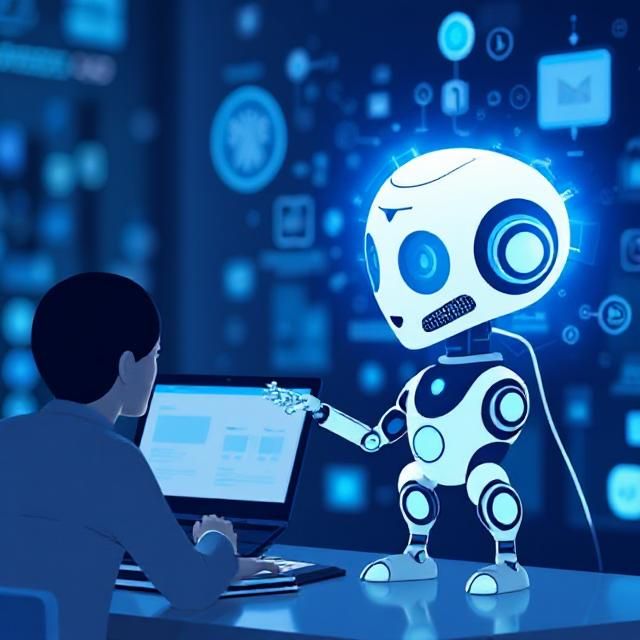4 minutes
Last Updated on Jul 1, 2025

From a buzzword a few years back into the backbone of contemporary digital marketing, artificial intelligence has undergone one of the most rapid transformations ever seen. Businesses using the right AI tools will find, in 2025, that they can automate repetitive tasks and analyze data at a much faster pace. They can also go on to personalize customer experiences and drive conversions more effectively.
But with so many options out there, finding the best AI solutions can feel downright daunting.
So let's get to know the top AI tools for digital marketing in 2025: you should focus on what works, spend your time more productively, and grow your business with better automation.
AI is not just changing marketing; It's redefining it. Companies that use AI tools to automate marketing tasks can:
Automate campaigns that once took days.
Analyze customer data for actionable insights.
Personalize all content to every individual on a significant scale.
Make budget adjustments in real time of advertising campaigns such as optimizing ad content.
Lifting the competitiveness of more companies
The net result is faster campaigns at lower cost with better financial return. In 2025, businesses that disregard AI will get left behind by competitors who can adapt more quickly and offer the best service to customers simultaneously.
Jasper remains a leader among AI tools for digital marketing, helping marketers write high-quality blog posts, ad copy, social media updates, and more. Jasper’s personalization features have advanced in 2025, allowing you to adjust the tone, style, and length of content for each audience segment.
Use Jasper when you want consistent, SEO-friendly content without sacrificing your brand voice.
ChatGPT’s integrations have expanded in 2025, making it a powerful addition to any marketing stack. Businesses use ChatGPT for drafting outreach emails, automating chatbot responses, creating campaign ideas, and even building customer service scripts.
With ChatGPT, you can provide instant, conversational experiences across your website, emails, and messaging apps, saving time and improving engagement.
HubSpot has taken its marketing automation suite to the next level with AI features like predictive lead scoring, smart content recommendations, and automated campaign analysis. These tools help marketers personalize every interaction, whether it’s an email, ad, or website visit.
HubSpot’s AI makes it easier to understand the customer journey, identify high-value prospects, and move them through the sales funnel.
Albert’s AI platform autonomously manages cross-channel advertising campaigns. It analyzes thousands of data points to optimize creatives, bids, and placements, removing guesswork from paid media management.
Businesses using Albert can scale campaigns faster and improve their return on ad spend without micromanaging every adjustment.
Surfer SEO combines AI with detailed SERP analysis to help marketers create content that ranks. Its algorithms recommend word counts, keyword density, and structure based on what already performs well in Google. In 2025, Surfer’s AI has become even better at identifying content gaps and opportunities.
This tool is invaluable for planning blog posts, landing pages, and website updates that align with search intent.
Seventh Sense uses AI to determine the best time to send emails to each subscriber, improving open rates and engagement. By analyzing each contact’s interaction history, Seventh Sense delivers messages when individuals are most likely to check their inbox.
This level of personalization increases the effectiveness of email campaigns without requiring manual effort.
Drift’s conversational AI helps businesses engage visitors on their websites in real time. By answering questions, qualifying leads, and scheduling meetings automatically, Drift reduces bounce rates and shortens the sales cycle.
Its conversational flows are designed to feel natural, improving the customer experience while gathering valuable data for your sales team.
Using AI tools for digital marketing is only effective if you integrate them strategically. Here’s how to do it:
Train your team on the features and best practices for each tool.
Define clear KPIs, such as improving email open rates or lowering customer acquisition costs.
Continuously review analytics and adjust campaigns as the AI learns from performance data.
The right combination of AI tools can save your team hours of work each week and deliver better results than traditional marketing alone.
At Upstrapp, we specialize in helping businesses integrate AI marketing software into their strategies. Our Web Development and Digital Marketing Services give you the technical and creative support you need to implement AI-powered solutions that increase leads and revenue.
AI is no longer optional in 2025 it’s the key to staying competitive. By adopting the right AI tools for digital marketing, you can automate smarter, personalize campaigns at scale, and convert faster. The businesses embracing AI today will set themselves apart in an increasingly crowded digital landscape.
Looking to get started with AI-powered marketing? Contact Upstrapp today to future-proof your digital strategy.